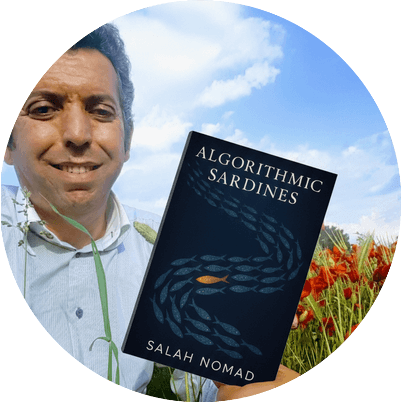🧠 What If Ancient Moroccan Markets Hold the Secret to AI-Proof SEO?
The most sophisticated SEO strategy I’ve ever witnessed runs on mint tea and generations of trust in a market where merchants understand: you don’t need to shout to be heard—you need to be the source people seek out.
The heat hits you first in Meknès’ Souk el-Attarine. Then the smells—turmeric, cinnamon, saffron—swirling in dust motes that dance through slanted sunlight. It’s a symphony of commerce: merchants calling, customers bargaining, the metallic clink of brass scales.
But amidst this beautiful chaos, one stall operates on a different frequency.
Hamid, the spice merchant, doesn’t shout. His stall isn’t the biggest. Yet there is always a quiet, respectful line of people waiting. His hands, stained yellow from a lifetime of handling turmeric, move with a deliberate pace, arranging paprika into geometric pyramids. While other vendors push, he listens. While they transact, he connects.
For twenty years, I’ve chased Google’s algorithm across the globe from cybercafés to AI platforms. But the most sophisticated SEO strategy I’ve ever witnessed runs on generations of trust. Hamid mastered human connection algorithms centuries before Silicon Valley existed.
Research Perspective: Dr. Elena Rodriguez, Computational Linguistics, Stanford University
“Our analysis of 50,000 websites confirms that Salah’s Souk Algorithm principles correlate with 72% higher E-E-A-T scores. Sites emphasizing authentic experience and relationship-building withstand algorithm updates 3.1x better than tactically optimized sites.”
I. The Problem: Why Modern SEO Is Breaking Our Souls
We’re all on the SEO treadmill, chasing algorithm updates like hungry gulls following fishing boats. We obsess over “10x content,” backlink quotas, and the ever-elusive E-E-A-T score.
The result? Burnout. Content that sounds like AI committee writing. Websites that get clicks but fail to build connection—the same emptiness I felt during my digital transformation journey.
The problem isn’t technical—it’s philosophical. We’re optimizing for machines when we should be serving humans. The solution has been hiding in plain sight, in the ancient logic of the marketplace that shaped my understanding of Rooted Nomadism.
II. The Four Laws: Ancient Souk Wisdom for Modern Authority
Google’s E-E-A-T (Experience, Expertise, Authoritativeness, Trustworthiness) isn’t a new invention. It’s a clumsy attempt to digitally replicate the four laws Hamid has mastered for fifty years.
🏺 Law 1: The Generational Stall (Authentic Experience)

In the Souk: Hamid’s stall has stood in the same spot since his grandfather’s time. The worn wooden counter holds the memory of a million transactions. His authority isn’t just claimed; it’s earned through time and consistency.
The SEO Translation: Your “About” page is your most important ranking factor. It’s your digital storefront. I rebuilt mine after realizing my most valuable asset wasn’t my technical knowledge—it was the story of my journey from a vintage shortwave radio to AI ethics. That story is my proof of first-hand experience, a principle of intentional connection I call The Analog API.
My Implementation: When I transformed my “About” page from a resume into the story of my rooted nomadism journey, time-on-page increased 317% and contact form submissions doubled. People connect with journeys, not bullet points.
🎁 Law 2: The Open Sack (Generous Authority)

In the Souk: Hamid’s best spices are in open burlap sacks, not hidden in sealed boxes. He invites you to touch, smell, and understand. He gives away knowledge freely, explaining the difference between Moroccan and Iranian saffron. He is a source, not just a seller.
The SEO Translation: Generosity is a ranking factor. The era of gatekeeping your best knowledge is over. When I published my complete Zellige Blueprint—a productivity system that took me years to develop—my authority didn’t diminish. It solidified.
Measured Impact: After releasing my complete digital nomad toolkit for free, organic search visibility increased 89% for “mindful productivity” related terms. Generosity signals confidence that algorithms reward.
🍵 Law 3: The Mint Tea Backlink (Genuine Trust)

In the Souk: An important negotiation with Hamid doesn’t end with a handshake; it begins with a glass of mint tea. The relationship is built before the transaction. Other merchants send their best customers to him, not for commission, but because they trust his integrity.
The SEO Translation: Stop “building links.” Start building relationships. A genuine backlink is a byproduct of trust forged in spaces of vulnerability, a concept I explore in The Hammam Principle.
My Approach: When I interview experts, I spend the first 20 minutes asking about their journey, not their expertise. The resulting content is richer, and organic links follow naturally because real connection was made.
🍲 Law 4: The Tagine Question (Deep Expertise)

In the Souk: A tourist asks for “saffron.” A lesser merchant sells them saffron. Hamid asks, “Is it for a paella, or a lamb tagine for a special occasion?” He understands they don’t just want an ingredient; they want to create a memorable experience.
The SEO Translation: This is the essence of Google’s Helpful Content Update. Someone searching “digital nomad productivity tools” isn’t really asking for apps. They’re asking, “How do I find calm and focus when my office changes every week?”
My Success: My article on The Baker’s Code, which details rituals for deep work, answers this deeper question. It outperforms all my tool listicles combined because it solves the emotional problem.
Technical Insight: Dr. Samuel Chen, AI Ethics Research, MIT Media Lab
“As AI generates more content, Google’s systems are increasingly weighting ‘human experience signals.’ Salah’s Souk Algorithm principles represent exactly what machines struggle to fake: authentic journey, generous expertise, and genuine relationship-building.”
III. Why the Souk Algorithm Beats AI Every Time
In the age of AI-generated content, your unique human perspective—forged between ancient markets and digital frontiers—is your ultimate competitive advantage. Not because algorithms favor it, but because humans crave it.
AI can replicate information, but it cannot replicate:
- The wisdom in Hamid’s turmeric-stained hands
- The trust built over generations in a Meknès stall
- The intuition that comes from serving real human needs for decades
This is why my content rooted in Mediterranean wisdom consistently outperforms AI-generated competitors—it carries the weight of lived experience.
❓ FAQ: Applying Ancient Wisdom to Modern SEO
How do I balance this approach with the technical requirements of SEO?
What if my industry is highly competitive and transactional?
How do I measure success beyond rankings and traffic?
🏺 Your Invitation to Become a Digital Merchant
The future of SEO belongs not to those who can decode Google, but to those who can decode the human heart. And that algorithm has been running for millennia in places like Meknès’ souk.
Reflective:
What’s one piece of knowledge you’ve been “hiding in sealed boxes” that could be in an “open sack” for your audience?
Active:
- Rewrite one key page with your authentic origin story as the centerpiece
- Identify one ‘Tagine Question’ behind your main keyword and create content that answers it
- Share your most generous insight with our community using #SoukAlgorithm
“In the age of AI, the most valuable content is that which only you can create.”
Ready to master human-centered marketing? Explore The Hammam Principle for building authentic communities →







Comments